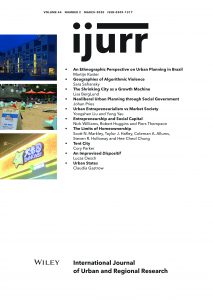Spatial approaches to examining entrepreneurship have increasingly built on theories of social capital. However, the nature and extent of local social capital in less successful deprived communities remains under researched and inadequately understood. This article examines the association between social capital and entrepreneurship in a deprived urban neighbourhood in the city of Leeds, UK as a means of contributing to an improved theoretical understanding of how space moderates this association. It is found that social capital has a strong association with patterns of entrepreneurship in deprived urban neighbourhoods, with the potential impacts being both positive and negative. The forms of social capital are found to differ from that found in more affluent localities, with a prevalence of bonding social capital as the key facilitator of entrepreneurship, which may help in the early stages of venture development, but which over time may become a constraint. Also, a lack of the bridging social capital associated with entrepreneurial success is found within the locality. From a policy perspective, it is recommended that policymakers responsible for entrepreneurship in deprived urban neighbourhoods should seek to enhance initiatives for developing social capital which incorporate local businesses, residents and local government agencies.
Details
Written by:
Nick Williams, Robert Huggins & Piers Thompson
Digital Object Identifier (DOI)
10.1111/1468-2427.12589
About DOI

